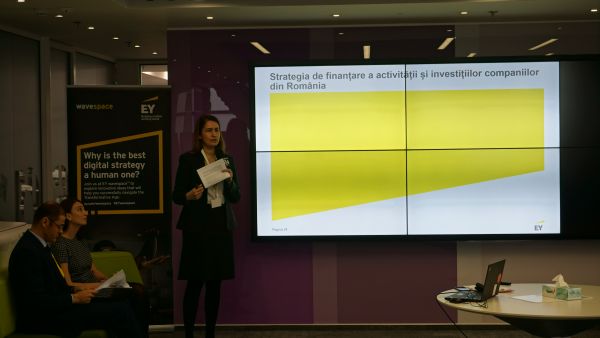The percentage of those who are optimistic about the Romanian economy dropped significantly compared to the previous edition of the study (18% in 2019 vs. 31% in 2018), illustrating a fund of concern, fueled by fiscal and legislative uncertainties, the unsustainable nature of economic growth on consumption and on inflationary pressures, these being just a few potential factors that can influence the business environment in 2019.
Given the lower private consumption growth rate projected in 2018, respondents' worrying fund fell in 2019 compared to 2018 (18% vs. 26%).
EY's report is based on an online survey of 301 organizational leaders from different sectors of the Romanian economy from 25 October to 10 December 2018.
From the perspective of the local market, the Romanian executives are losing optimism, keeping the same high level of confidence for the demand for products and services (44%). When it comes to private investment in the local economy, the level of confidence decreases, with 36% of respondents giving a negative vote. As for the capital market, Romanian businessmen are not very optimistic, only 15% of them claiming confidence in its evolution.
The same negative outlook also points to the short-term stability of markets. Analyzing the evolution of the confidence of Romanian companies' leaders on the local economy at the end of 2018 vs. its start, there is an increase in the number of optimists in terms of company profitability (25% vs. 20%).
Top of strategic priorities
Cost cuts (27%) and productivity growth (26%) are the top priorities for Romanian executives taking into account the business environment conditions in the past year.
Talent acquisition complements top priorities, being significantly more important for leaders of companies with majority foreign capital
Large companies (considering the number of employees and turnover) put the cost reduction on the forefront, while the smallest ones focus on increasing productivity.
Country strategy
98% of business respondents indicate the need for a country strategy geared towards sustainable growth and recovery of the structural gap to the West. Romania must continue to fight corruption to continue efforts to improve regulation and the fiscal framework to encourage greater private sector investment. Improving the absorption of European funds to reduce the country's infrastructure gap is an important factor in increasing productivity.
Economists support the government's adoption of a neutral tax strategy - otherwise, macroeconomic stability is threatened. The tensions created at the legislative and economic level make Romania a less attractive country for investments.
In order for the country strategy to be successful, the businessmen interviewed believe that the most important factor to be considered is legislative and / or fiscal coherence and the stability that Romania lacks for many years. Infrastructure and investments are important issues that should be a priority in the country strategy.
Top three challenges of the business environment
The most important barriers to business development for managers and entrepreneurs in Romania in 2019 continue with public policies and factors controlled by state institutions, such as fiscal uncertainty (72%), the lack of political stability (58%) and the bureaucracy (53%). The latter, together with the state of the national economy, and the level of taxation, are worrying reasons for many of the Romanian executives, registering a 4-7 percent increase compared to the previous year. At the same time, the lack of entrepreneurial education and the difficult access to financing are obstacles facing the Romanian business environment.
"The cost of financing mentioned as an obstacle is in fact more related to its variation: the optimistic forecasts at the beginning of 2018 did not come true until the end of the year, the cost of financing in lei increased in 2018, which led to increased attention to this aspect in the business strategy of entrepreneurs. We observe, however, a rapprochement between our own resources and bank loans as a share, also explained by the fact that businesses have matured and more and more entrepreneurs choose to reinvest, "says Ioana Mihai, Associate Partner, Assistance in Transactions, EY Romania.
85% of companies see their investment plans questionable in 2018
Last year's fiscal and legislative uncertainties affected investment plans for 57% of Romanian companies. 38% of respondents, business leaders in the country, say that investment plans have been largely or largely affected by fiscal and legislative uncertainties.
Only 19% of leaders believe that investment plans have been affected to a small or very limited extent by tax uncertainties.
"We have to track in the coming quarters if it really will lower the level of investment and employment. We see that Romanian entrepreneurs are more worried than the leaders of foreign companies. It is natural, foreign companies are active in many markets, they have a greater resilience to possible economic shocks, and can ask for funding and support from the parent company. Stability and predictability of the fiscal environment are very important in the coming period, "says Alex Milcev, Head of Fiscal and Legal Aid Department, EY Romania.


































